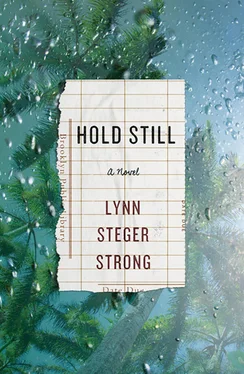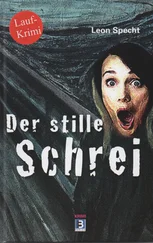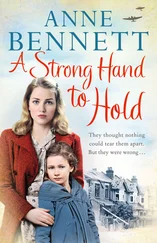Ellie nods, handing her dad the last bite of muffin. She wants to sidle closer to him and let him tell her exactly how she might make everything better. She’s not sure she’s willing to concede.
“You want company?”
Maya turns around. It’s four-thirty in the morning. Ben wears shorts and running shoes, a long-sleeved dark red shirt. He stands halfway up the steps. She’s so grateful now that they were never the type of family to cover their walls in photos of each other, of their friends. Now, as she stares up toward her son, she catches sight of the massive Neil Welliver print Stephen got her years ago. Cora’s Sky , it’s called, and she’s always been comforted by the broad swaths of oranges and blues.
Maya smiles. “Sure.” She double-knots her second shoe.
Ben bounds down the steps.
“I’m going to be too slow for you,” she says.
He shrugs. “I’m not in training for anything.”
“Well, no pressure to stay close.”
He shakes his head, pulls his arms up, fingers laced, and places his palms behind his head. They walk out of the apartment and Maya locks the door.
“Park or bridge?” says Ben.
“Your call,” she says.
“Bridge.” And Maya’s so grateful for his choosing the longer, her preferred, route, she almost wraps her arms around her son.
They take her usual route down Bergen. The city smells like trash, exhaust, and bacon. She watches him hold his long legs in check.
“She used to come into my room sometimes,” he says. His head keeps facing straight.
Maya’s breath catches a few seconds. She sees Ben’s feet clip in even closer as her pace has briefly slowed. She stretches her legs out once and then another couple times before he speaks again.
“I don’t. . I’m not sure when it started. Or if she even knew what she was doing. But she did it a bunch of times.”
“I didn’t. .” She says it quietly. They pass a road under construction: dug up asphalt, crumbled concrete, and orange cones.
“One time, she got up and started yelling at me to get out of her bed. But it’s not like I could explain to her that it was my bed.” A small bodega on the corner, with rows of flowers outside, a school, a yoga studio. “She was too fucked up to know which room was hers.” He shakes his head, rolls his shoulders. “I just went to her room.”
“Do you miss her?” Maya asks him. She’s not sure this is right, but she wants him to keep talking. When she first went down to Florida, Ben was the only one that Ellie spoke to on the phone.
“Yeah, I mean. .” He’s quiet awhile, and Maya eyes the park just north of the bridge and then the courthouse, columns, concrete, and a blockade setup in front. The traffic’s heavier as they approach the bridge and someone honks and tires screech as they wait for the light to change.
“She’s my sister, you know?” her son says.
Two years before: she’d taken him to dinner, picked him up from practice. He didn’t need picking up anymore; she’d sat on the sidelines like she had all those years of his forming, watching the boys yell to one another, gesture, run, the thwack of foot to ball, their impossibly long limbs. They all wore shorts, though it was just beginning to get cold out. They wore the socks up to their knees and the shorts that almost fell as far. Patches of bright red skin, knees and sides of thighs, popped out as they ran after one another and the ball.
She was, mostly, a terrible watcher. She was the type to pull out a book in lines or on the subway, on trains or buses, when the kids or Stephen would keep their eyes on the world. Maya wasn’t capable of that much stillness, that much sustained attention to the outside world. Soccer had seduced her over the years, though, its beautiful simplicity, the boys’ doggedness, their strength. The crack of the whistle breaking through the low steady yells. The boys falling down the field in patches, the way they looked back at one another, could get free sometimes, just the ball and boy then, the steady, rushed control. She often felt winded when it was over, as if she’d held her breath through the whole thing.
After he had sat with his friends to take off his shoes and shin guards, pull on sweatpants, gulp down water, Ben had come over easily, happily, to her. They walked the fifteen minutes to the restaurant.
“I think I chose,” he said, refilling his water with the jug the waiter had left on the table, then refilling hers. He’d been on official visits all up and down the coast and a handful out West. Stephen was obsessive, so Maya had backed off. Her son’s face was still flushed as he spoke to her and ordered his dinner. He was still, daily, slipping between all the various men he might one day be and then back again to the boy she’d always known.
“Ohio,” he said. They’d gone out there together, the three of them; Maya had needed to be convinced to leave Ellie home alone. She was nineteen then, but Maya had called her three, four times a day. The school had been small, bucolic, frighteningly quiet. She’d wondered the whole time how people stayed sane amid all that empty space. None of them thought he’d choose it. It was a smaller school, a smaller team, than any of the others. Even the coach had seemed sure Ben would play someplace else. Stephen had made light of the coach’s desperation, had suggested the competition was not of sufficient rigor. Ben seemed to know this now, looking at her, chastened, his chin dipped to his chest as he began to eat his pasta.
“I guess,” Maya said. She wanted to say the thing that would prove he was right to tell her, that she could be trusted. That she would help him no matter where or what he chose. “It’s a great school,” she said.
Her son nodded into his plate. This wasn’t enough, maybe, he needed more, she thought. “That sort of change,” she said. She thought again of all that quiet, all those trees. “It could be edifying, maybe,” she said.
Her son smiled then, like he did sometimes when she drifted. “Sure, Ma,” he said. “It could be.”
She laughed, took a bite of her fish. “We’ll miss you,” she said, once she’d swallowed. “Benny,” she said. She thought of El then, all that worry, the not knowing, the way it seemed to rush through every crevice of their lives that was not already solidly filled in. “We’ll miss you desperately,” she said.
Her son gulped more water. He held his napkin to his mouth and scraped his fork along the bottom of his plate. “I need it, though, you know?” he said. “I think. .” He stopped again. He brought his hands up to the table, his shoulders rose, his head went down, then up, “I need to get away,” he said.
The way he’d looked then, the way he’d held her there, signaling a different sort of man than all the ones she’d seen in him before that, she’d almost asked if she could come along.
The light changes and they cross. A large clock blinks atop a building: It’s twenty-eight degrees, not quite five a.m.
As they cross the middle of the bridge, between the two arches, they pass a woman whom Maya sees often when she runs at this time, late sixties maybe. She wears the same long large mink every morning, a full face of makeup, and old Converse shoes. She swings her arms and walks, her feet crossing in front of one another, her gaze never straying from straight ahead.
“I don’t want to go back,” Ben says.
Maya keeps her eyes toward her toes.
“To school,” he says. “I hate it. I hate everyone who’s there.”
It’s as if he’s been practicing these sentences for months.
“What would you do?” she asks her son.
They pass two women walking in unison, both wearing neon tights; matching headbands hold their hair.
Читать дальше












